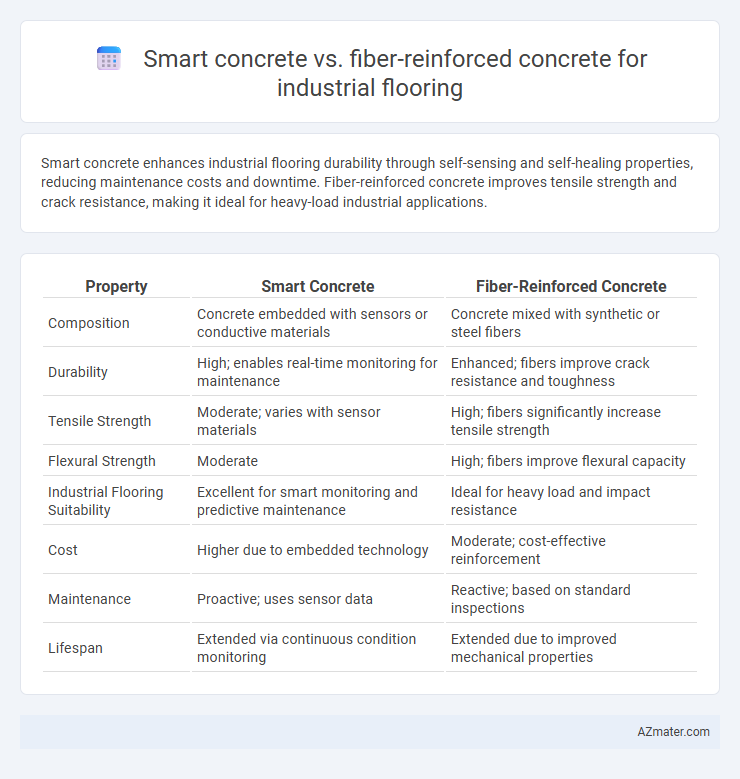Smart concrete enhances industrial flooring durability through self-sensing and self-healing properties, reducing maintenance costs and downtime. Fiber-reinforced concrete improves tensile strength and crack resistance, making it ideal for heavy-load industrial applications.
Table of Comparison
| Property | Smart Concrete | Fiber-Reinforced Concrete |
|---|---|---|
| Composition | Concrete embedded with sensors or conductive materials | Concrete mixed with synthetic or steel fibers |
| Durability | High; enables real-time monitoring for maintenance | Enhanced; fibers improve crack resistance and toughness |
| Tensile Strength | Moderate; varies with sensor materials | High; fibers significantly increase tensile strength |
| Flexural Strength | Moderate | High; fibers improve flexural capacity |
| Industrial Flooring Suitability | Excellent for smart monitoring and predictive maintenance | Ideal for heavy load and impact resistance |
| Cost | Higher due to embedded technology | Moderate; cost-effective reinforcement |
| Maintenance | Proactive; uses sensor data | Reactive; based on standard inspections |
| Lifespan | Extended via continuous condition monitoring | Extended due to improved mechanical properties |
Introduction to Industrial Flooring Solutions
Industrial flooring solutions increasingly rely on advanced materials like smart concrete and fiber-reinforced concrete for enhanced durability and performance. Smart concrete integrates sensors and self-healing properties to monitor structural integrity and reduce maintenance costs, making it ideal for high-traffic industrial environments. Fiber-reinforced concrete offers superior tensile strength and crack resistance, ensuring long-lasting floors that withstand heavy loads and mechanical stresses common in industrial settings.
Defining Smart Concrete: Features and Applications
Smart concrete incorporates embedded sensors and self-sensing materials, enabling real-time monitoring of structural health and stress levels in industrial flooring. This innovative material enhances durability by detecting micro-cracks and environmental changes, allowing preventive maintenance before significant damage occurs. Fiber-reinforced concrete improves mechanical strength and crack resistance, but lacks the intelligent monitoring capabilities that define smart concrete's advanced performance.
Overview of Fiber-Reinforced Concrete in Industrial Settings
Fiber-reinforced concrete (FRC) enhances industrial flooring durability by integrating synthetic or steel fibers that improve tensile strength, crack resistance, and impact absorption. This concrete type effectively withstands heavy machinery loads and abrasive wear, making it ideal for warehouses, factories, and distribution centers. Compared to traditional concrete, FRC reduces maintenance costs and extends the service life of industrial floors under high-stress conditions.
Comparative Material Properties: Smart vs. Fiber-Reinforced Concrete
Smart concrete incorporates embedded sensors enabling real-time monitoring of stress, temperature, and structural health, enhancing durability and maintenance for industrial flooring. Fiber-reinforced concrete improves tensile strength and crack resistance through the inclusion of synthetic or steel fibers, providing superior mechanical performance under heavy loads. While smart concrete offers advanced data analytics for proactive asset management, fiber-reinforced concrete delivers immediate structural benefits by increasing toughness and reducing shrinkage-related damage.
Performance Under Heavy Loads: Which Concrete Prevails?
Smart concrete incorporates self-sensing and self-healing properties that enhance durability and crack resistance under heavy industrial loads. Fiber-reinforced concrete, embedded with synthetic or steel fibers, significantly improves tensile strength and impact resistance, making it highly effective for load-bearing applications. Performance under heavy loads favors fiber-reinforced concrete due to its superior mechanical strength and toughness, while smart concrete excels in long-term maintenance and structural health monitoring.
Durability and Lifespan: Long-term Industrial Flooring Benefits
Smart concrete incorporates self-healing technologies that enhance crack resistance and significantly extend the lifespan of industrial flooring by automatically sealing micro-cracks. Fiber-reinforced concrete improves tensile strength and reduces shrinkage, providing superior durability under heavy industrial loads. Combining both materials can optimize long-term performance, reducing maintenance costs and downtime in industrial environments.
Crack Resistance and Maintenance Requirements
Smart concrete integrates self-healing agents or conductive materials that enable automatic crack repair and improved structural health monitoring, significantly reducing maintenance frequency in industrial flooring. Fiber-reinforced concrete enhances crack resistance through the distribution of micro-fibers that control shrinkage and improve tensile strength but may still require periodic inspections and maintenance to address larger cracks. Comparing both, smart concrete offers advanced durability and lower long-term maintenance costs due to its autonomous healing properties, whereas fiber-reinforced concrete provides immediate toughness and crack control but depends more on external maintenance interventions.
Installation Process and Cost Analysis
Smart concrete offers advanced self-sensing capabilities that simplify monitoring in industrial flooring but requires specialized installation techniques and higher upfront costs. Fiber-reinforced concrete involves integrating synthetic or steel fibers during mixing, enhancing durability with a more straightforward installation process and moderate material expenses. Cost analysis reveals that fiber-reinforced concrete generally provides a more budget-friendly solution with lower labor demands, while smart concrete's initial investment is justified by reduced long-term maintenance and enhanced structural health monitoring.
Sustainability and Environmental Impact Considerations
Smart concrete incorporates self-sensing and self-healing properties, reducing maintenance frequency and extending the lifespan of industrial flooring, which significantly lowers resource consumption and waste generation. Fiber-reinforced concrete enhances durability and crack resistance by integrating synthetic or natural fibers, improving structural integrity and minimizing the need for repairs or replacements, thus conserving raw materials and energy. Both materials contribute to sustainable industrial flooring solutions by optimizing performance, reducing carbon footprint, and supporting circular economy principles through enhanced longevity and reduced environmental impact.
Choosing the Right Concrete for Industrial Flooring: Key Takeaways
Smart concrete enhances industrial flooring durability through self-sensing and self-healing properties, reducing maintenance costs and downtime. Fiber-reinforced concrete improves tensile strength and crack resistance by incorporating synthetic or steel fibers, ideal for high-load environments. Selecting between the two depends on specific performance needs, with smart concrete favored for real-time monitoring and fiber-reinforced concrete chosen for structural toughness.

Infographic: Smart concrete vs Fiber-reinforced concrete for Industrial flooring
 azmater.com
azmater.com